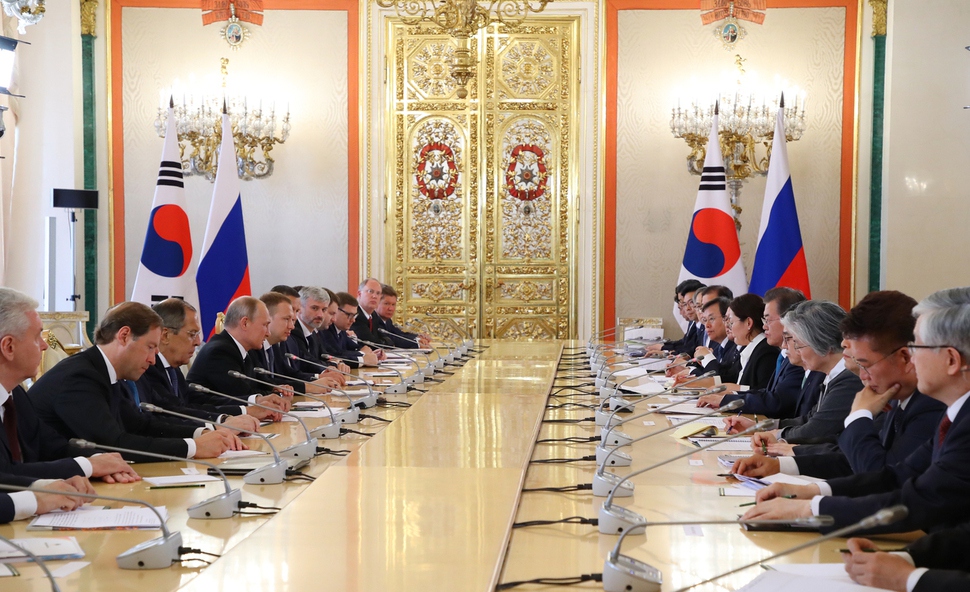 |
|
South Korean President Moon Jae-in shakes hands with Russian President Vladimir Putin during a smaller summit at the Grand Kremlin Palace in Moscow on June 22. (Yonhap News)
|
Moon and Putin recognize Korean peace regime would benefit both countries
The emphasis on economic cooperation in a June 22 summit between South Korean President Moon Jae-in and Russian President Vladimir Putin appears closely linked to rapid changes in the Korean Peninsula political situation since the June 12 North Korea-US summit in Singapore. Stressing a process leading from North Korea’s denuclearization to the lifting of sanctions and increased economic cooperation, the South Korean and Russian leaders expressed the position that the denuclearization and establishment of peace on the Korean Peninsula would ultimately be in both countries’ economic interests. In a joint press statement following the summit that day, President Moon said the two leaders had “agreed to strengthen communication and cooperation so that the Korean Peninsula and Eurasia can prosper together.” “We plan to diligently implement projects that South Korea and Russia can prioritize to prepare for trilateral cooperation [with North Korea],” he added. In their summit that day, the two leaders also agreed to cooperate on a railroad project involving the shared use of the Rajin-Hasan railway to build a Eurasian network linking South Korea with Russia and Europe, while researching and cooperating on a linkage of the Trans-Siberian Railway (TSR) and a Trans-Korean Railway (TKR). While the “Rajin-Hasan project” has been halted due to Seoul’s independent sanctions against North Korea, it is seen as an effort that could potentially help all four sides – South and North Korea, China, and Russia – by functioning not only as an area of South Korea-Russia cooperation but as a distribution base for China’s northeast once it gets back on track with North Korea’s implementation of its denuclearization agreement. Once linked, the TSR and TKR could also serve as routes for international transportation linking Europe and Asia. Analysts predicted South Korea and Russia’s agreement on June 22 could lend momentum toward an inter-Korean agreement on linking the Donghae Bukbu railway. President Moon and Putin also agreed to initiate domestic procedures for negotiations toward a bilateral service-investment FTA. President Moon proposed “reaching the priority targets of US$30 billion in trade and one million people in human exchanges by the 30th anniversary of bilateral relations in 2020 for the sake of shared prosperity in the Eurasian era.” The two leaders also agreed to develop an action plan to advance economic cooperation in priority areas including the “nine bridges” proposed by President Moon (natural gas, railways, seaport infrastructure, electricity, Arctic shipping routes, shipbuilding, job creation, agriculture and fisheries) in Sept. 2017. “Once peace is established on the Korean Peninsula, a new chapter will be written in South Korea-Russia economic cooperation,” President Moon predicted in a South Korea-Russia Business Forum speech attended by businesspeople from both sides.
 |
|
South Korean President Moon Jae-in speaks with Russian President Vladimir Putin (left) during their extended summit at the Grand Kremlin Palace in Moscow on June 22. (Yonhap News)
|







